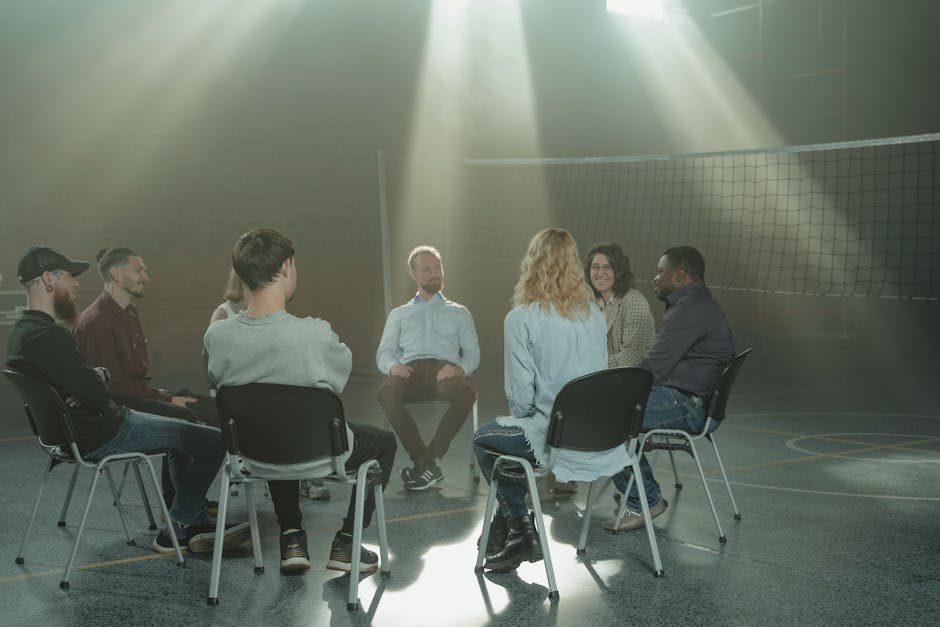Group therapy, a powerful tool in the world of mental health, offers a multitude of benefits. It provides a supportive environment, fosters learning and insight, and empowers individuals to express themselves. This blog post will delve into the many advantages of group therapy and why it could be a valuable addition to your mental health journey.
Key Takeaways
- Group therapy provides a supportive and understanding environment.
- It promotes learning and offers valuable insights.
- It encourages self-expression and personal growth.
- Group therapy enhances social skills and is cost-effective.
- It fosters a sense of community and camaraderie.
Introduction to Group Therapy
Definition of Group Therapy
Group therapy is a form of psychotherapy where one or more therapists treat a small group of clients together. It’s a collaborative approach that harnesses the power of group dynamics and peer interactions to stimulate growth and change.
Overview of the Blog Post Content
In this blog post, we will explore the numerous benefits of group therapy, from providing a supportive environment to enhancing social skills. We will also discuss the variety of group therapy techniques and their effectiveness compared to individual therapy.

Supportive and Understanding Environment
Reduction of Isolation
One of the key benefits of group therapy is the reduction of feelings of isolation. Participants realize that they are not alone in their struggles, which can be incredibly comforting and reassuring.
Validation of Personal Experiences
Group therapy provides a platform for individuals to share their experiences and feelings, leading to validation from others who have had similar experiences. This validation can be a powerful healing tool.

Learning and Insight
Observational Learning
Exposure to New Coping Strategies
In a group therapy setting, participants can learn from each other’s experiences. They are exposed to various coping strategies, which they can then apply in their own lives.
Gaining Diverse Perspectives
Group therapy offers a unique opportunity to gain diverse perspectives. Participants can learn from each other’s viewpoints, fostering empathy and understanding.
Insight from Group Interactions
Group interactions can provide valuable insights into one’s own behavior and thought patterns. This can lead to increased self-awareness and personal growth.

Expression and Empowerment
Opportunities for Self-Expression
Group therapy provides a safe and supportive environment for individuals to express their feelings and thoughts. This can be incredibly empowering and therapeutic.
Being Heard and Understood
In a group therapy setting, participants have the opportunity to be heard and understood by others. This can lead to increased self-esteem and confidence.
Improvement of Communication Skills
Group therapy can also help improve communication skills. Participants learn how to effectively express their thoughts and feelings, which can be beneficial in their personal and professional relationships.

Feedback and Personal Growth
Sharing Personal Experiences
Sharing personal experiences in a group setting can be a powerful tool for personal growth. It allows individuals to reflect on their experiences and gain insights from others’ feedback.
Receiving Constructive Feedback
Group therapy provides a platform for receiving constructive feedback from both the therapist and other group members. This feedback can be instrumental in fostering personal growth and change.
Enhancing Self-Awareness
Group therapy can enhance self-awareness by providing insights into one’s own behavior and thought patterns. This increased self-awareness can lead to positive changes and personal growth.

Enhancement of Social Skills
Navigating Group Dynamics
Group therapy provides an opportunity to navigate group dynamics, which can enhance social skills. Participants learn how to interact effectively with others, which can be beneficial in their personal and professional lives.
Application in Personal and Professional Relationships
The social skills learned in group therapy can be applied in personal and professional relationships. This can lead to improved relationships and increased satisfaction in various areas of life.

Cost-Effectiveness
Accessibility to More Individuals
Group therapy is often more cost-effective than individual therapy, making it accessible to more individuals. This is particularly beneficial for individuals who may not be able to afford individual therapy.
Professional Guidance at Lower Costs
Group therapy offers professional guidance at lower costs. Participants can benefit from the expertise of a trained therapist, while also gaining support and insights from other group members.
Community and Camaraderie
Fostering a Sense of Belonging
Group therapy can foster a sense of belonging among participants. This sense of community can be incredibly comforting and supportive.
Mutual Encouragement and Support
In a group therapy setting, participants can offer mutual encouragement and support. This can foster a sense of camaraderie and enhance the therapeutic experience.

Variety of Group Therapy Techniques
Tailored Benefits for Specific Needs
Cognitive Behavioral Therapy (CBT) Groups
CBT groups focus on helping participants identify and change negative thought patterns and behaviors. This can be particularly beneficial for individuals struggling with conditions like depression or anxiety.
Support Groups
Support groups provide a platform for individuals to share their experiences and offer mutual support. They can be particularly beneficial for individuals dealing with specific issues, such as grief or addiction.
Process Groups
Process groups focus on the group process and dynamics. They can provide valuable insights into interpersonal relationships.
Psychoeducational Groups
Psychoeducational groups focus on providing information and education about specific mental health issues. They can be particularly beneficial for individuals newly diagnosed with a mental health condition.
Skills Development Groups
Skills development groups focus on teaching specific skills, such as stress management or problem-solving. These groups can be particularly beneficial for individuals looking to enhance their coping strategies.
Effectiveness and Alternatives to Individual Therapy
Research Findings on Group Therapy
Research has shown that group therapy can be as effective as individual therapy for many mental health conditions (source). It can be particularly beneficial for individuals dealing with issues like depression, anxiety, and substance abuse.
Suitability for Various Conditions
Group therapy can be suitable for a variety of conditions. It can complement other forms of treatment, such as individual therapy or medication.
Complementing Other Forms of Treatment
Group therapy can complement other forms of treatment, such as individual counseling, interpersonal therapy, or holistic counseling. It can also be beneficial in conjunction with problem-solving therapy or art therapy.
In conclusion, group therapy offers a multitude of benefits, from providing a supportive environment to fostering personal growth. It can be a powerful tool in the journey towards mental health and wellbeing.
Unraveling the Power of Unity: Discover the Benefits of Group Therapy FAQ
What is group therapy and how does it differ from individual therapy?
Group therapy is a form of psychotherapy where a small, structured group of individuals meet regularly to discuss and explore their issues with the guidance of a trained therapist. Unlike individual therapy, where the therapeutic focus is on one person, group therapy offers a collective environment where members can share experiences, offer mutual support, and learn from each other’s insights. The group dynamic often helps members realize they are not alone in their struggles, which can be a powerful component of the healing process.
What types of issues can group therapy help with?
Group therapy can be beneficial for a wide range of issues, including but not limited to depression, anxiety, substance abuse, trauma, grief, and interpersonal relationship challenges. It provides a supportive network and a sounding board. Members can gain diverse perspectives on common problems, which can be particularly helpful in understanding and managing personal issues.
How does group therapy promote personal growth?
Group therapy encourages self-awareness by providing feedback from peers who may be experiencing similar issues. This environment fosters a sense of belonging and acceptance, allowing individuals to practice new behaviors within a safe space. The group setting also offers opportunities to learn and practice social skills, enhancing personal development and the ability to form healthier relationships.
Is group therapy as effective as individual therapy?
Effectiveness can vary depending on the individual and the issue being addressed, but research has shown that group therapy is often as effective as individual therapy for many conditions. It provides different therapeutic benefits, such as peer support and the opportunity to learn from others, which can complement the insights gained from individual therapy.
What are the typical rules or guidelines for group therapy participation?
Common guidelines for group therapy include confidentiality, respect for all members, regular attendance, active participation, and a commitment to the group process. These rules help create a safe and trusting environment where members feel comfortable sharing and engaging with the group.
Can I benefit from group therapy if I’m introverted or shy?
Yes, many introverted or shy individuals find group therapy beneficial. It can provide a gradual and supportive environment to open up and share at one’s own pace. Over time, group therapy can help improve self-esteem and social skills, which can be particularly valuable for those who naturally tend toward introversion or shyness.
How long does group therapy typically last?
The duration of group therapy can vary widely depending on the type of group and the issues being addressed. Some groups are time-limited and may last for a set number of weeks or months, while others are ongoing and members may participate for as long as they find it helpful. The frequency of meetings also varies, with most groups meeting once a week.
What if I don’t feel comfortable with the other group members?
Feeling comfortable with group members is an important part of the therapeutic process. It’s common to feel uneasy at first, but comfort levels often improve over time as trust is built. If discomfort persists, it’s important to discuss these feelings with the group therapist, who can help facilitate a better group fit or address interpersonal dynamics within the group.
How do I know if group therapy is right for me?
Determining if group therapy is suitable involves self-reflection and possibly an initial assessment with a therapist. Consider whether you’re open to sharing with and learning from others, and if you’re willing to commit to the group process. A therapist can help evaluate your specific needs and recommend the best course of action, whether it’s group therapy, individual therapy, or a combination of both.
What should I look for in a group therapy program?
Look for a group therapy program led by a qualified and experienced therapist with expertise in the issues the group addresses. The group should have clear guidelines and a structure that feels comfortable for you. It’s also important to consider the size of the group, the goals of the program, and the level of commitment required. Many find it helpful to attend a trial session or speak with current or past members before committing to a program.



